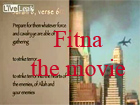« Disparaging Remarks About Plight of Iraqi Kurds Under Saddam Hussein By Arianna Huffington | Main | Oriana Fallaci Dies Of Cancer At Age 77 »
September 15, 2006
Muslim World Reacts Violently To Pope Saying Jihad Is Violent
 The "violence" is only in the "anger" sense for now - but give it time, it's already being feared and threatened - after all, look at all that happened because of cartoons!
The "violence" is only in the "anger" sense for now - but give it time, it's already being feared and threatened - after all, look at all that happened because of cartoons!
Only in the circular logic of the Islamist mindset steeped in a 10th Century tribal and bedouin culture would such a thing occur. As Robert Spencer puts it at Jihad Watch: "OK, so let me get this straight: the Pope says that jihad violence is against God's nature, and officials fear that in response, Muslims enraged by this insult will commit...jihad violence.
Go figure!
And as we posted yesterday in our piece titled, "Pope Slams Violence In Islam - Invites Dialogue: A Call For Reform Of Islam From Within?," in what Time.com describes as "a riveting and provocative university lecture," the Pope "explored the philosophical and historical differences between Islam and Christianity by citing the concept of jihad and referencing Muhammad by name, while sending "the world a signal that it's time for hard questions - not hugs and handshakes."" The Pope went on to question the concept of "holy war" (Jihad), and quoted a 14th-Century Christian emperor who said Muhammad had brought the world only "evil and inhuman" things (a comment bound to ruffle a few feathers in the Muslim world, but isn't the Pope's point made for him by those that react violently to comments about Jihad and violence?).
To help put this in the right perspective, let's turn to Professor Bainbridge, who offers several key points regarding the Pope's lecture that Muslim leaders should have, but will refuse to, take into account:
The simplistic view is to focus on the portion of the speech in which the Pope quotes Byzantine emperor Manuel II Paleologus' comment that "Show me just what Mohammed brought that was new, and there you will find things only evil and inhuman, such as his command to spread by the sword the faith he preached."Professor Bainbridge concludes that in the end, he believes that the the Pope does curve the discussion back to the problem of religiously motivated terror: "A reason which is deaf to the divine and which relegates religion into the realm of subcultures is incapable of entering into the dialogue of cultures" - which Professor Bainbridge reads as a shot across the bow of post-Christian Europe - a warning that Europe increasingly lacks the tools demanded to meet the threats of the day. Since it is the subculture of violent Jihadism and militant Islam within Islam itself that is the source of religiously motivated terror, the Popes comments are not only appropriate but do little more than state the obvious. And one would think that a reasonable person could find little to disagree with regarding this point - given the daily diet of Islamic terrorism of which the world experiences with ever- increasing frequency, with certainly much more to come (again, the Pope's points are made for him by the very people that are reacting with anger and rage over the suggestion that they are violent and do not act with reason and dialogue).Predictably, certain Muslims leaders are whipping up outrage over the quotation (the same ones who whipped up the outrage over the Danish cartoons?).
No doubt the Pope had Islamic radical terrorism in mind when he elaborated that:
The emperor goes on to explain in detail the reasons why spreading the faith through violence is something unreasonable. Violence is incompatible with the nature of God and the nature of the soul. "God is not pleased by blood, and not acting reasonably ("syn logo") is contrary to God's nature. Faith is born of the soul, not the body. Whoever would lead someone to faith needs the ability to speak well and to reason properly, without violence and threats.... To convince a reasonable soul, one does not need a strong arm, or weapons of any kind, or any other means of threatening a person with death....... to see this speech solely in terms of a clash of civilizations between Christianity and Islam would be error. Instead, the Pope is staking out a set of claims about the relationshiop of man and God that stand in opposition not only to the Islam of Ibn Hazn, but also that of the Protestant Reformers, the Jesus of History crowd, and (an area of particular concern for this pope) post-Christian Europe. The Pope is also renewing the claims of the Church Universal to have a truth that is transcendent, rather than culturally-bound.The decisive statement in this argument against violent conversion is this: Not to act in accordance with reason is contrary to God's nature. The editor, Theodore Khoury, observes: For the emperor, as a Byzantine shaped by Greek philosophy, this statement is self-evident. But for Muslim teaching, God is absolutely transcendent. His will is not bound up with any of our categories, even that of rationality. Here Khoury quotes a work of the noted French Islamist R. Arnaldez, who points out that Ibn Hazn went so far as to state that God is not bound even by his own word, and that nothing would oblige him to reveal the truth to us. Were it God's will, we would even have to practice idolatry.
Regarding the Jihadists making the Pope's points for him, take for example, the head of Egypt's Muslim Brotherhood - Hot Air reminds us of the cleric that gave young Ayman al-Zawahiri his start in fundamentalism, and who hinted yesterday that insulting the prophet could "trigger wars":
That comes straight from the MB's English-language website, by the way. You'll find it tucked in between a fawning interview with Zawahiri's elderly uncle and a preemptive reminder that "Israel Will Be Responsible For The Next 9/11."And the MB example is only the begining of the Jihadist mindset flowing to the surface of the Islamist world. It appears that no matter what is said to encourage Muslim leaders to condemn violence and terrorism, to act, speak, and think with reason instead of the usual Jihadist/Islamist/Muslim knee-jerk reactions to every call for reform and dialogue, it's always just more of the same ole/same ole "sensitivities", anger, and reactionary violence.Turkey's top religious official says the Pope's visit this winter is in jeopardy. The leader of one of Kuwait's religious parties called on Arab Muslim states to recall their ambassadors from the Vatican. But the prize for best reaction goes to our pal Sheikh Qaradawi of al-Azhar University, who urged Benedict to listen to "reason":
In Qatar, prominent Muslim scholar Sheikh Youssef al-Qaradawi rejected the Pope's comments and said Islam was a religion of peace and reason."Muslims have the right to be angry and hurt by these comments from the highest cleric in Christianity," Qaradawi told Al Jazeera television. "We ask the pope to apologize to the Muslim nation for insulting its religion, its Prophet and its beliefs."
And wasn't the issue of "R E A S O N" that the Pope was speaking of the need for in the Muslim world - in the first place?
Other coverage: Riehl Word View, Independent Conservative,
Related:
Michelle Malkin is covering another Islamist cultural problem, perhaps more tribal than religious - Child slavery in Dubai.
- Police in Indian Kashmir seized newspapers carrying Pope Benedict XVI's strong criticisms of Islam and jihad, fearing a Muslim backlash in the flashpoint area.
Source: Hyscience
Posted by Richard at September 15, 2006 7:41 AM


